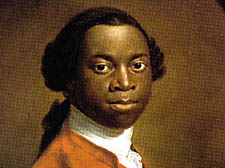|
|
 |
| |

A portrait always thought to be of Equiano now no longer
attribute to Sir Joshua Reynolds

Prof Vincent Caretta

Gene Adams

Frontispiece from the first edition volume 1 of Olaudah
Equiano’s Interesting Narrative (London 1789) |
The mystery of Equiano
This masterly book about the
18th-century anti-slavery hero Olaudah Equiano attempts to solve the puzzle of his birthplace, writes Gene Adams
Equiano the African: Biography of a Self-made Man by
Professor Vincent Caretta
University of Georgia Press, £17.20
EVERYBODY who is familiar with the brilliant 18th-century memoir:
The Interesting Narrative of Olaudah Equiano, or Gustavus Vassa,
the African, Written by Himself, published 1789, will enjoy
Professor Vincent Carretta’s marvellous exposition of this
18th-century ‘autobiography.’
His masterly description of Equiano’s campaign against
the slave trade of the 18th century, will undoubtedly be a classic
in its own right. It is immensely scholarly, based on scrupulous
research from both English and American archives. It is also
very readable with that provocative twist of an unsolved mystery
which lifts it out of the realm of a purely academic study.
The mystery is of Equiano’s birthplace. Was it Africa,
somewhere in modern Nigeria as stated on his baptismal certificate?
Unfortunately, from my personal point of view, this discussion
tends to detract from the meat of the story. This is a pity
because it is a true story which needs to be known, and to be
studied deeply as this biography does, without the distraction
of too much academic speculation.
Being born in Africa myself, though not that part of the continent,
I do not find his Igbo childhood story difficult to believe.
To me Equiano is a precursor of thousands of Africans struggling
to find new cultural identity in a fast changing world.
The late Professor Paul Edwards of Sierra Leone College and
then Edinburgh University, who published the first facsimile
of Equiano’s book in 1967 said: “Equiano remembered
and was deeply influenced throughout his life by his stable
African childhood and his respect for his ‘titled’
Igbo father…
“For all his literary skill and persuasive oratory”
his success owed much to “the flexibility with which he
adapted himself whilst holding to the principles implanted in
him during his African childhood.”
Paul Edwards in the same paper (1992) also remarked that the
“innocence” of the original reception of Equiano’s
story in 1789 had been replaced since the 1960s by “the
more artful hands of literary critics, mostly from the United
States”.
The mystery arises from the exciting discovery by Carretta of
written records of Equiano’s birthplace – in our terms
‘irrefutable new evidence’ – from two sources:
a baptismal certificate dated February 9 1759, from St Margaret’s
Westminster, which states “Gustavus Vassa a Black born
in Carolina 12-years-old.”
And there is a similar comment from a 1773 Muster Roll of one
of the ships Equiano worked on serving his English owner and
master, Captain Michael Pascal. But this new evidence raises
many questions. The exact date of birth of the boy is not provable
or agreed among experts today.
Possibly the age given of “12-years” was wrong as
well as the place of birth. Who would have given that information
to the clergy carrying out the baptism?
As Equiano was but a child and also a servant, this information
must surely have come from Pascal the master, whose word no
one would have dared question, certainly not a small black slave
boy.
But Pascal, as Carretta has also discovered, had reasons for
concealing the slave status of the child, as slavery was frowned
on by the Royal Navy. Furthermore, Equiano’s godmother
and patron, Miss Guerin, was later a subscriber to the 1789
memoir with its description of an African childhood – not
“Carolina” – and also his famous eye witness
account of the journey in the slave ship to the West Indies.
Either Miss Guerin did not see the baptismal certificate, or
did not read the book later. Or she went along with an enormous
lie over eight years.
Pascal died in 1787 – two years before publication. Certainly
new ‘evidence’ is fascinating and must be discussed,
not ignored. But it must also be questioned, like any other
puzzling information. It would be naïve to think all written
records are ‘the truth’ – then or now.
There is one other mystery attached to the study of Equiano
and that is the beautiful oil portrait in the Art Gallery at
Exeter which is reproduced on Carretta’s book cover.
As Carretta states, it is now thought not to be a portrait of
Equiano – apart from anything else, the style of the clothes
do not fit with his approximately
known dates. It is also no longer attributed to Sir Joshua Reynolds.
The question urgently to be researched by today’s students
is, who was the obviously highly intelligent black man in an
elegant scarlet coat?
And who painted him and on what occasion?
|
|
 |
|




